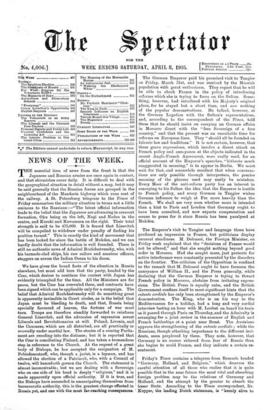We have given the broad facts of the situation in
Russia elsewhere, but must add here that the party, headed by the Czar, which desires to continue the contest with Japan has evidently triumphed for the time. All the Ministers are for peace, but the Czar has overruled them, and contracts have been signed which can be applicable only for a campaign. The belief that Admiral Rozbdestvensky will do something great is apparently invincible in Court circles, as is the belief that Japan must be bleeding to death, and that, Russia being specially favoured of heaven, the fortune of war must turn. Troops are therefore steadily forwarded to reinforce General Linevitch, and the advocates of repression arrest Liberals and Revolutionaries at will. Poland, Livonia, and the Caucasus, which are all disturbed, are all practically or avowedly under martial law. The stories of a coming Parlia- ment are receding into the distance; but it is reported that the Czar is conciliating Finland, and has taken a tremendous step in reference to the Church. At the request of a great body of Bishops, be has accepted the resignation of M. Pobiedonostzeff, who, though a jurist, is a layman, and has allowed the election of a Patriarch, who, with a Council of twelve, will henceforth govern the Church. The statement is almost inconceivable; but we are dealing with a Sovereign who on one side of his head is deeply "religious," and it is made apparently upon official authority. If it is true, and the Bishops have succeeded in emancipating themselves from bureaucratic authcuity, this is the greatest change effected in Russia yet, and one with the most far-reaching consequences.










































